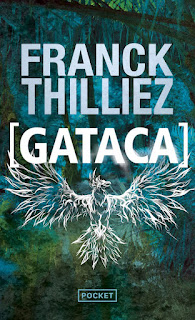[Gataca] - Franck Thilliez
At the agonising opening of [Gataca] then, Lucie Henebelle has been visiting morgues of dead children expecting the worst and facing it, having now left the police service in Lille so that she can deal with her personal trauma. Sharko meanwhile has a new guilt to pummel himself with, and it's not doing much for his sociability and manner as a police commissioner. On an investigation in his new post, Sharko comes across the death of a young zookeeper at an animal research lab, apparently killed by an ape that has never exhibited any signs of violence. Around the same time, Lucie has just been informed that the murderer of one of her twin daughters, Grégory Carnot, has just killed himself in a gruesome manner while in prison.
What connects the two events, or a common element that lies in both, already hinted at in the title of the book and a brief introduction by the author, is the question of DNA and the influence it has on behaviour. It's no surprise that everything is connected and related to DNA. Already it comes up in animal research, in the studies of the young woman murdered in the zoo, with Lucie having given a sample of her DNA in the search for her daughter, in the trace of Sharko's DNA suspiciously found on a former convicted child killer. Since they are separated by a border, neither of them any longer considered trusted police officers, one having taken voluntary demotion, the other having left service, it seems like Thilliez is going to have to be creative to find a way of drawing them back together. And he does that through a study into the relationship between left-handedness and violence.
It was the murdered woman in the zoo, Eva Louts, who had been working on a study of violence and its association with left- handedness. This involved travel to Brazil, to Mexico, even to historical and paleontological records, drawing on questions of natural selection and evolution. It has also involved prison visits to dangerous criminals like the left-handed Carnot just before his death. There is even a case to explore a crime scene of the murder of a Neanderthal family by a left-handed Cro-Magnon killer uncovered by the melting of a glacier in the French Alps. A cold case indeed. Linking two murders that happened 30,000 years ago with an upside down drawing found in a cave and in the cell of a left-handed murderer 3 days ago, Thilliez definitely goes to places that few other crime writers go...
...and takes Sharko and Henebelle there too of course. For Thilliez there's nothing so bad for these two that he can't make worse and DNA is again the key to that, with revelations about Lucie's family history of twins and tragedy, Sharko's increasing disillusionment causing difficulties and behavioual irregularities - "Il s'y traînait comme un fantôme en pénitence poussant sa grosse boule de rancoeur avec sa maigre carcasse fatiguée." They have difficult jobs dealing with dangerous murderers, but it's not so hard to believe Sharko's observation that the two of them are cursed. What this means of course is that there is a near explosive level of tension from one chapter to the next that makes it hugely readable, enjoyable and endlessly thrilling. Well, until the end, but even then...
Much like Le Syndrome [E], Thilliez simultaneously clarifies what is at stake here - exploring the nature of violence down to biological levels - while layering on other levels of complexity in the relationship of events, the DNA studies (all of which have a basis in science), and establishing connections between them all at a very deep level. He even connects humanity on a very basic level, with the minute differences between our chemical and biological make-up that set us apart in significant ways. Which means connecting Sharko and Lucie, both of whom have had personal experience and their lives shattered by violence, in a meaningful way with what is at stake. Taking in the scale of the crime, anthropology, paleontology, genetics and the deep personal individual experience of the main characters, blending fiction with well-researched science, makes [Gataca] hugely impressive and utterly compelling right through to the last page.
Reading notes: The edition of [Gataca] by Franck Thilliez I read was the French Pocket 608-page paperback. It's incredible and unfortunate that Thilliez is not translated into English. On the limited reading I have done so far, he is one of the most original writers of crime fiction that I have come across, or at least appears to be so in the combined (mis)adventures of Henebelle and Sharko. I've promptly picked up Atom[ka] and the following two books in the series, and will definitely be following this author's writing further.




Comments
Post a Comment